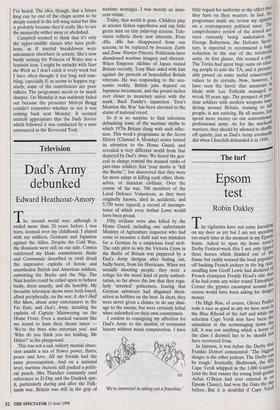Television
Dad's Army
debunked
Edward Heathcoat-Amory
The second world war, although it ended more than 20 years before I was born, loomed over my childhood. I played with toy soldiers, Germans and Japanese against the Allies. Despite the Cold War, the Russians were still on our side. Comics reinforced my khaki commitment. Battle and Commando described in vivid detail the impressive exploits of heroic and unorthodox British and American soldiers, outwitting the Boche and the Nip. The Nazi hordes could be relied upon to behave badly, dress smartly, and die horribly. My favourite television shows were both based, albeit peripherally, on the war; It Ain't Half Hot Mum, about army entertainers in the Far East, and Dad's Army, detailing the exploits of Captain Mainwaring on the Home Front. Even a musical vacuum like me learnt to hum their theme tunes 'We're the boys who entertain you' and `Who do you think you are kidding, Mr Hitler?' in the playground.
This was not a sad, solitary martial obses- sion amidst a sea of flower power, flares, peace and love. All my friends had the same preoccupation. And on a national level, wartime rhetoric still packed a politi- cal punch. Mrs Thatcher constantly used references to D-Day and the Dunkirk spir- it, particularly during and after the Falk- lands war. Britain was still in the grip of wartime nostalgia. I was merely an inno- cent victim.
Today, that world is gone. Children play at science fiction superheros and zap little green men on tiny palm-top screens. Tele- vision reflects these new interests. Even Alio, Alio has disappeared from our screens, to be replaced by invasion: Earth and Zena: Warrior Princess. Politicians have abandoned wartime imagery and rhetoric. When Emperor Akihito of Japan visited Britain recently, Tony Blair sided with him against the protests of bemedalled British veterans. He was responding to the eco- nomic reality. British jobs depend on Japanese investment, and the pound inches ever closer to monetary union with the mark. Basil Fawlty's injunction 'Don't Mention the War' has been elevated to the status of national creed.
So it is no surprise to find television debunking some of the wartime myths to which 1970s Britain clung with such affec- tion. This week's programme in the Secret History (Channel 4, Monday) series turned its attention to the Home Guard, and revealed a very different world from that depicted by Dad's Army. We heard the gen- eral in charge remind the massed ranks of part-time soldiers that 'your motto is "kill the Boche",' but discovered that they were far more adept at killing each other, them- selves, or innocent civilians. Over the course of the war, 768 members of the Local Defence Volunteers, as they were originally known, died in accidents, and 5,750 were injured, a record of incompe- tence of which even Arthur Lowe would have been proud.
Fifty civilians were also killed by the Home Guard, including one unfortunate Ministry of Agriculture inspector who had come to measure a field and was mistaken for a German by a suspicious local mob. The only pilot to win the Victoria Cross in the Battle of Britain was peppered by a Dad's Army shotgun after bailing out, badly burnt, from his Hurricane. When not actually shooting people, they were a refuge for the worst kind of petty authori- tarian, so far above the law that they regu- larly 'arrested' policemen, fearing that German saboteurs had disguised them- selves as bobbies on the beat. In short, they were never given a chance to do any dam- age to the enemy, but were certainly lethal when unleashed on their own countrymen.
I confess to consigning my affection for Dad's Army to the dustbin of revisionist history without much compunction. I have `We're interested in taking out a franchise.' little regard for uniforms or the effect that they have on their wearers. In fact, the programme made me review my opinion on a contemporary political issue. The comprehensive review of the armed ser" vices currently being undertaken by George Robertson, the Defence Seem' tary, is expected to recommend a huge, reduction in the size of the territorial army. At first glance, this seemed a pq. The Tories had spent huge sums on entic- ing people to join the TA, and it presum- ably passed on some useful conservative values to its recruits. Now,. however, .1 have seen the havoc that amateurs in khaki with Lee Enfields managed to wreak 50 years ago. The prospect of part' time soldiers with modern weapons Wan; dering around Britain, training to lull people, is not enticing. By all means, lets spend more money on our conventional, professional army. As for the weekend warriors, they should be allowed to shuffle off quietly, just as Dad's Army eventuallY did when Churchill disbanded it in 1944.


































































 Previous page
Previous page